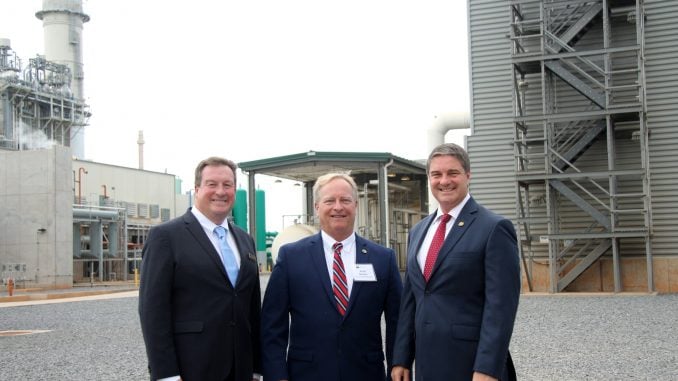
KINGS MOUNTAIN, NC – Cleveland County officially became home to what has been touted as one of the cleanest and most efficient power plants in the nation last week, as NTE Energy’s Kings Mountain Energy Center (KMEC) formally began operations.
Officials from NTE Energy joined with city, county, and state leaders to cut the ribbon on the $500 million facility. The 475 MW natural gas-fired plant is providing clean energy to more than 400,000 homes through long-term agreements with nine municipalities in the Carolinas.
“We are extremely proud of this milestone and offer our thanks and congratulations to everyone who had a hand in bringing this state-of-the-art facility to completion,” NTE Energy CEO Seth Shortlidge said. “We have enjoyed building long-lasting relationships with the city of Kings Mountain and our customers as we work to bring significant power cost savings and economic development opportunities to the Carolinas.”
At the height of construction, Shortlidge noted, KMEC created more than 350 construction jobs. The facility now employs 25 skilled positions to handle daily operations.
Based in St. Augustine, Florida, NTE Energy, through its affiliates, develops and acquires strategically located electric generation and transmission facilities within North America.
NTE’s first clean power plant began operations earlier this year in Middletown, Ohio, where local officials have praised the company for delivering on its pledge to be a partner in providing the community with cleaner, more affordable energy. NTE’s second Carolinas power plant – the Reidsville Energy Center – is currently under construction in Rockingham County, with plans in development for a third energy center in Anderson, S.C. and a solar energy center in Eastern North Carolina.
“Historic” regional impact
John Skvarla, former N.C. Secretary of Commerce now with Nexsen Pruet law firm, noted that the Kings Mountain project is significant in many ways for the affiliated municipalities, as well as for the entire North Carolina energy industry.
“The NTE contract provides the municipality a 20-year certainty for planning purposes — unheard of by any measure. Any municipality who has the opportunity to take advantage of these benefits and does not do so, is unequivocally in breach of its fiduciary obligations,” he said.
Of additional importance, Skvarla noted the absence of traditional incentives offered to NTE to locate in Kings Mountain, as well as the “instant” property tax revenue and high-paying jobs that are well above the county average.
From Skvarla’s perspective, the rural-urban divide is the most significant economic issue facing North Carolina today. He believes that NTE’s example offers an immediate economic bridge to address this problem as “rural service areas now have a material advantage in recruiting transformative industries.”
“NTE is a disruptive force in the industry and has become one of the most important economic drivers in North Carolina’s history.”
Paradigm shift
Regarding statewide energy policy and the industry’s current operations, Donald van der Vaart, former N.C. Secretary of Environmental Quality now a fellow at the John Locke Foundation, said, “What companies like NTE are proving is that there may no longer be the need for a captive market to attract investment in electricity generation.”
Van der Vaart explained the current model for electricity sales to North Carolina’s residential customers as being set up “to protect the public utility [Duke Energy] from competition” in order to ensure investment and funding for future capital projects such as coal and nuclear plants. However, the evolution of available resources leading to natural gas-fired electricity production has proven to be a game changer.
With the dramatic increase in regulatory and development costs for coal and nuclear plants, investors and municipalities are turning to natural gas facilities for a fraction of the cost. “As more and more communities consider leaving Duke,” van der Vaart said, “I would expect Duke to tighten their belt or to expand their ‘unregulated’ division in response to this competition.”



